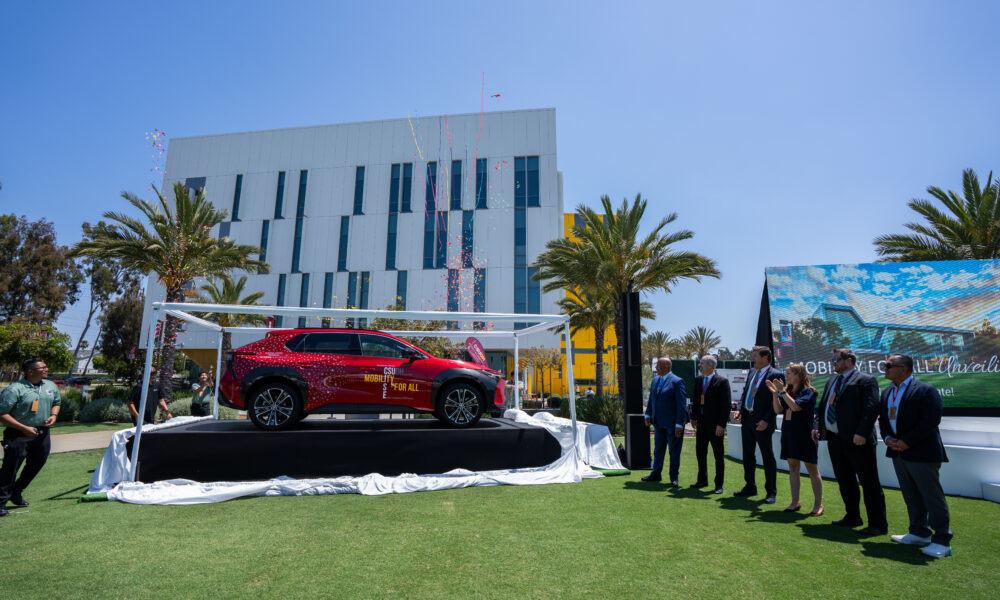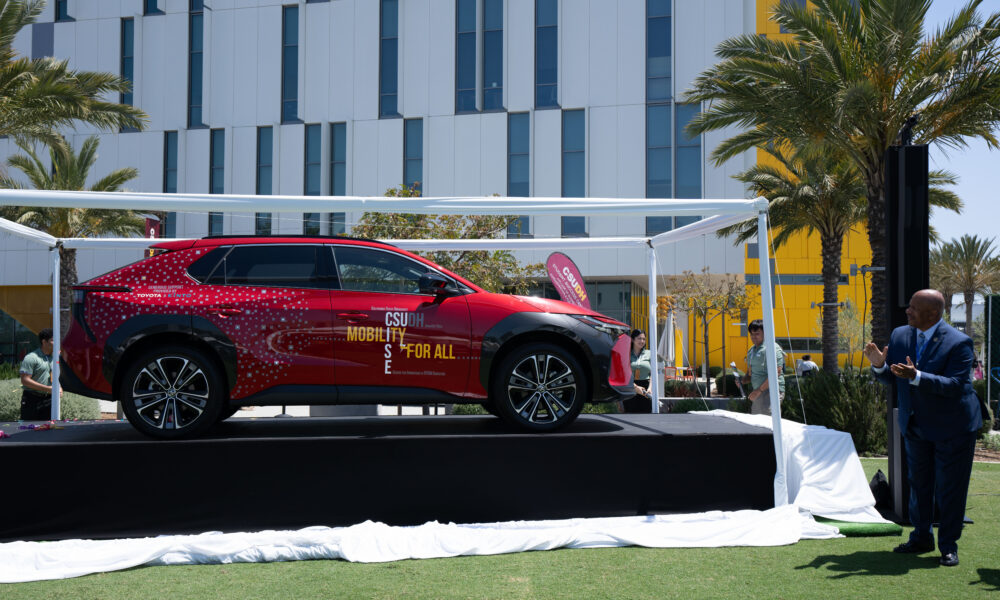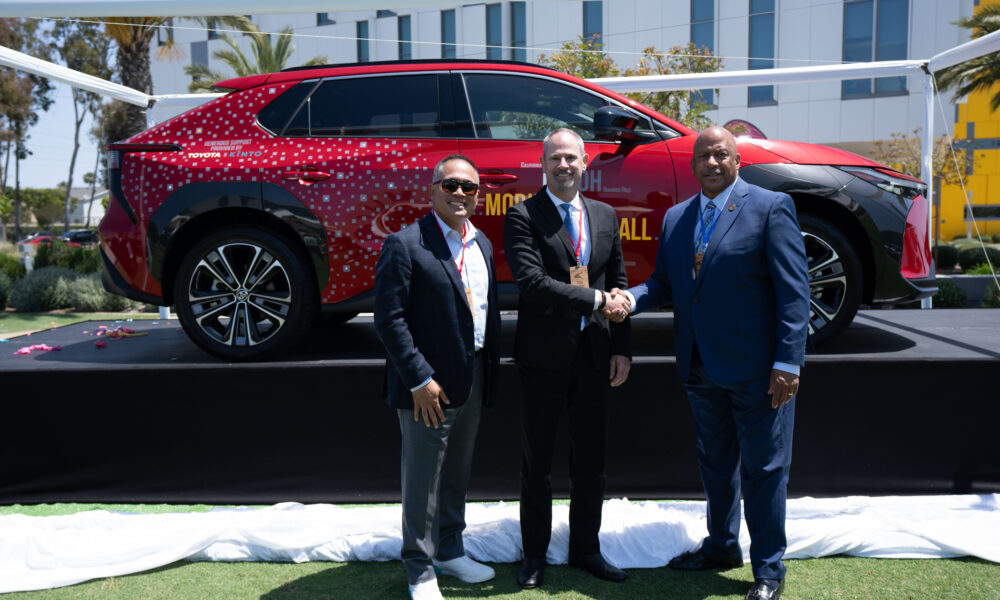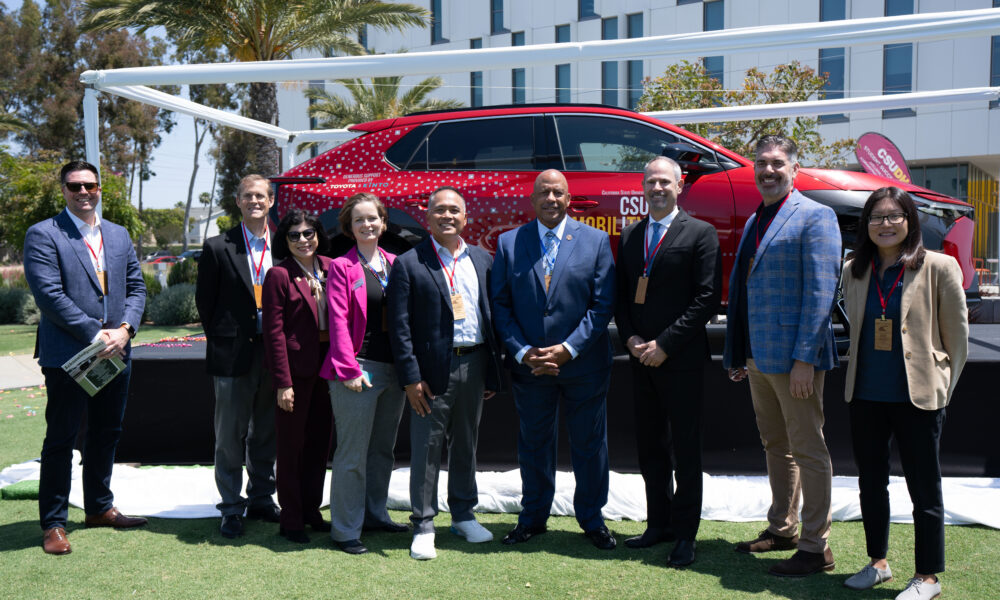CARSON, Calif. (April 30, 2024) – California State University, Dominguez Hills (CSUDH) and Toyota Motor North America (TMNA) today launched a multipronged program focused on transportation equity for the university and its surrounding communities based on the idea of “Mobility for All.”
“Knowledge is a catalyst for progress, and collaboration with industry partners is essential for advancing academic research and innovation at our university,” said CSUDH President Thomas A. Parham. “We are incredibly grateful for Toyota’s longstanding support and investment in of our educational mission and look forward to our continued partnership in building a better, more sustainable, and equitable future.”
The initial phase of the program will establish the Center for Resilient, Equitable, and Sustainable Transportation (CREST) at CSUDH, made possible by a $1.2 million grant from Toyota. Housed within CSUDH’s Center for Innovation in STEM Education, CREST will engage faculty and students in research, curricula, and paid internships to find solutions to the myriad of mobility challenges faced by members of the university and wider community.
“Toyota believes that when people are free to move, anything is possible,” said Tom Stricker, group vice president, Toyota Sustainability & Regulatory Affairs. “CREST aligns perfectly with Toyota’s ‘Mobility for All’ vision, which aims to leave ‘no one behind’ by providing people with accessible, low, and zero emission mobility solutions to meet their diverse needs.”
CSUDH students, many of whom are low-income, minority, or first-generation, face numerous barriers to education—one of which is inadequate transportation. More than 95 percent of CSUDH students commute to campus, and a needs assessment conducted in communities around the university revealed transportation disparities and limited public transit options. CREST will serve as an information hub, offering resources for accessible and affordable transportation options for CSUDH students, faculty, and staff. CREST will expand its reach to the City of Carson and other target geographic areas over the course of five years.
“CREST will offer students and local residents mobility options that are flexible, affordable, reliable, and accessible,” said Kamal Hamdan, executive director for the CSUDH Center for Innovation in STEM Education. “This is a transformational project focused on improving quality of life and creating lasting change in the communities we serve.”
Providing students with sustainable and accessible transportation is another key element of the program. KINTO, Toyota’s carsharing program, will supply CSUDH with 20 hybrid and/or battery electric vehicles starting in Fall 2024 to increase students’ access to convenient vehicle renting at a highly discounted rate. With improved transportation options, students could have more time to better focus on their academic goals, have easier access to job opportunities, and be able to take full advantage of living in Greater Los Angeles. To accommodate the new vehicle fleet and offer improved charging capabilities on campus, CSUDH is also partnering with Southern California Edison to install Level 2 electric charging stations on campus in the near future.
“KINTO mobility solution is designed to increase mobility through the EV-based ridesharing program,” said Kevin McKeever, general manager, KINTO & Fleet Management. “With 34 locations already across California, we’re excited to open the newest KINTO location on the CSUDH campus for students, faculty, and staff. To make the program even more accessible, for the first year, we are offering a special discounted hourly rate to the CSUDH community.”
Additionally, CSUDH is in the early stages of reconfiguring the space along Victoria Parkway into a Metro Transit Hub. This joint project with the City of Carson would be funded by $3.5 million allocated to the campus by LA Metro. The ultimate vision of “Mobility for All” is to create a campus Mobility Hub to help minimize commuters’ carbon footprint with upgraded public transit and transportation inter-modalities.
“Just as the university upgraded its infrastructure to support the 1984 Olympics and host events, CSUDH aims to ready the campus to better serve attendees of the 2028 Summer Olympics, for which we are hosting several events,” said Vice President for University Advancement Eva Sevcikova.
“Whether it’s higher education, the government, or the private industry, every partner at the table is driven by a collective focus on the socio-economic mobility of our students—helping them attain a college degree and join the region’s workforce,” she said. “These initiatives promise to create ripples throughout the South Bay, benefitting communities and better connecting us all.”
About California State University, Dominguez Hills
California State University, Dominguez Hills cultivates an academic community committed to justice, equity, and inclusion – one that fosters a sense of belonging and advances social mobility for our graduates. For more than five decades, we have provided knowledge, talent, and leadership to Southern California and beyond. Strategically located to bring educational pathways to underserved communities in the aftermath of the 1965 Watts Rebellion, we proudly educate many first-generation college students. Ranked first in the nation for expanding college access and increasing economic opportunities, CSUDH delivers a transformative education that is grounded in culturally sustaining practices, innovative research, creativity, and community engagement. We are dedicated to fostering students’ critical inquiry, career readiness, and passion for lifelong learning—ensuring that upon graduation, students are equipped to lead and thrive in the industries shaping the future. For more information, visit www.csudh.edu.
About Toyota
Toyota (NYSE:TM) has been a part of the cultural fabric in North America for more than 65 years, and is committed to advancing sustainable, next-generation mobility through our Toyota and Lexus brands, plus our more than 1,800 dealerships.
Toyota directly employs more than 63,000 people in North America who have contributed to the design, engineering, and assembly of nearly 47 million cars and trucks at our 13 manufacturing plants. By 2025, Toyota’s 14th plant in North Carolina will begin to manufacture automotive batteries for electrified vehicles. With more electrified vehicles on the road than any other automaker, Toyota currently offers 27 electrified options.
For more information about Toyota, visit www.ToyotaNewsroom.com.
Media Contacts
Amanda Roark
(496) 292-2636
[email protected]
Lilly McKibbin
(310) 243-2034
[email protected]


 Add to Cart
Add to Cart Print
Print Convert to PDF
Convert to PDF









